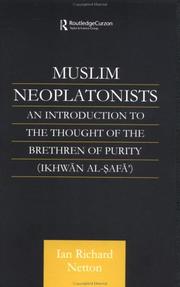| Listing 1 - 2 of 2 |
Sort by
|
Book
ISBN: 9781107032217 9781139424752 1139424750 9781107250369 1107250366 1107032210 1107241677 1139889648 1107251192 110724787X 1107248701 1107249538 1299772633 9781107241671 9781139889643 9781107251199 9781107248700 9781107249530 Year: 2013 Publisher: Cambridge Cambridge university press
Abstract | Keywords | Export | Availability | Bookmark
 Loading...
Loading...Choose an application
- Reference Manager
- EndNote
- RefWorks (Direct export to RefWorks)
Drawing on Arabic passages from Ibn Gabirol's original Fons Vitae text, and highlighting philosophical insights from his Hebrew poetry, Sarah Pessin develops a 'theology of desire' at the heart of Ibn Gabirol's eleventh-century cosmo-ontology. She challenges centuries of received scholarship on his work, including his so-called Doctrine of Divine Will. Pessin rejects voluntarist readings of the Fons Vitae as opposing divine emanation. She also emphasizes pseudo-Empedoclean notions of 'divine desire' and 'grounding element' alongside Ibn Gabirol's use of a particularly Neoplatonic method with apophatic (and what she terms 'doubly apophatic') implications. In this way, Pessin reads claims about matter and God as insights about love, desire, and the receptive, dependent and fragile nature of human beings. Pessin reenvisions the entire spirit of Ibn Gabirol's philosophy, moving us from a set of doctrines to a fluid inquiry into the nature of God and human being - and the bond between God and human being in desire.
Neoplatonism --- Jewish philosophy --- Philosophy, Medieval --- Islamic philosophy --- Ibn Gabirol, --- Neoplatonism. --- Jewish philosophy. --- Philosophy, Medieval. --- Islamic philosophy. --- Arabic philosophy --- Muslim philosophy --- Philosophy, Islamic --- Philosophy, Arab --- Medieval philosophy --- Scholasticism --- Jews --- Philosophy, Jewish --- Philosophy, Israeli --- Alexandrian school --- Church history --- Hellenism --- Philosophy --- Philosophy, Ancient --- Platonists --- Theosophy --- Arts and Humanities --- Ibn Gabirol, - active 11th century

ISBN: 1138147176 1136853901 1315028859 1136853839 9781136853906 0700714669 9780700714667 9781315028859 9781136853975 9781138147171 Year: 2013 Publisher: London ; New York : Routledge,
Abstract | Keywords | Export | Availability | Bookmark
 Loading...
Loading...Choose an application
- Reference Manager
- EndNote
- RefWorks (Direct export to RefWorks)
The tenth or eleventh century group of the Brethren of Purity (Ikhwan al Safa) are as well known in the Arab world as Darwin, Marx and Freud in the west. Designed as an introduction to their ideas, this book concentrates on the Brethren's writings, analyzing the impact on them of thinkers such as Pythagoras, Plato, Aristotle and the Neoplatonists. Ian Netton traces the influences of Judaism and Christianity, and controversially this book argues that the Brethren of Purity did not belong to the Ismaili branch of Islam as is generally believed.
Islamic philosophy. --- Philosophy, Medieval. --- Medieval philosophy --- Scholasticism --- Arabic philosophy --- Muslim philosophy --- Philosophy, Islamic --- Philosophy, Arab --- Ikhwān al-Ṣafāʼ. --- Ikhwān al-Ṣafāʼ, Basra --- Ichwán es-Safâ --- Ikhvān al-Ṣafā --- Aḥim ha-neʼemanim --- Ihwān al-Safaʼ --- Frères de la Pureté --- Frères de la Sincérité --- Ikhwān al-Ṣafā, wa-Khillān al-Wafā, wa-Ahl al-ʻAdl, wa-Abnāʼ al-Ḥamd --- Exvān al-Ṣafā --- Pure Brethren of Basra --- إخوان الصفا --- إخوان الصفاء، البصرة --- اخوان الصفاء --- اخوان صفا --- Brethren of Purity --- Ikhvan as-safa
| Listing 1 - 2 of 2 |
Sort by
|

 Search
Search Feedback
Feedback About UniCat
About UniCat  Help
Help News
News